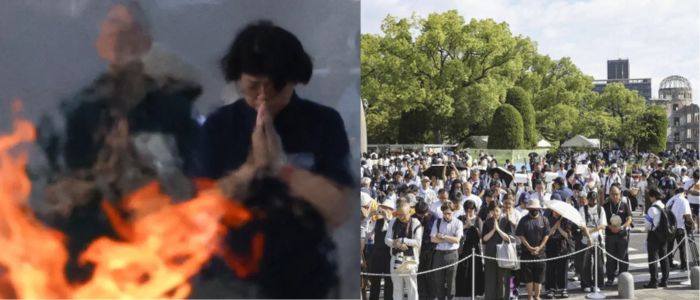The first was a uranium bomb, Little Boy, that destroyed Hiroshima on 6 August 1945.
Approximately 78,000 people died instantly in the explosion. Thirty thousand others would later die themselves, through burns and radiation poisoning.
Only 3 days later, the second bomb was dropped, at Nagasaki, and Japan surrendered on 15 August, and WWII was over.
The bombings of Hiroshima annihilated the city. It was selected in part for its topography, with mountains that officials say one theory holds intensified the bomb blast.
Peace Memorial and Global Reflection
The annual commemoration was held at Hiroshima's Peace Memorial Park, built on the epicenter of the 1945 blast and where thousands went to pray for relatives and friends who perished with the war-ending detonation.
As ever, schoolchildren and ordinary people laid flowers and water as a mark of respect for the dead or those who were injured.
Exactly 8:15 a.m.: A moment of silence was held—the time the bomb was dropped. Hiroshima Mayor Kazumi Matsui next made the Peace Declaration, repeating an appeal for the abolition of nuclear weapons.
This year the ceremony also fell against a message by a United Nations component on behalf of Secretary General António Guterres, asking for international dedication to peace.
More than 1,000 students from around Japan joined in the Promise of Peace, sharing messages of hope and remembrance.
That reflected rising global concern for the fate of nuclear weapons and was the largest contingent of international delegates honored in the ceremony's history.
Warnings Against Rising Militarism
Matsui cautioned that war clouds were again gathering, and some leaders believed nuclear weapons were indispensable for national security. He also mentioned that even with the cuts, the United States and Russia own 90% of the world's nuclear weapons.
Such a mentality negates the sufferings of centuries and makes the global peace-building processes ineffectual," he added. For All World Leaders:
Go to Hiroshima and see the faces of the Atomic Bomb Victims
Attendees echoed his sentiment. 'It is as if history were being repeated,' said Yoshikazu Horie, 71. What's scary is what happens in Europe & Asia. My grandchildren — I want them to have peace.
Survivors and Japan's Position
And many of the survivors of the atomic attack, known as hibakusha, have spent decades with their memories alone, shunned in a Japanese society that once associated radiation-related illness with contagion.
Just as referred to previously, the number of hibakusha who no longer survive is less than 100.000.
Nuclear disarmament is something Japan advocates; however, it is not a part of the United Nations Treaty on the Prohibition of Nuclear Weapons.
While the country abides by not having, making, or allowing nuclear weapons on its land, it has yet to sign up to the global ban on such arms.
But as Hiroshima recognizes this tragic anniversary, the message has stayed the same: never forget, and prevent history from ever repeating itself.
World

Hiroshima Marks 80 Years Since Atomic Bombing

Thousands of people gathered in Hiroshima, Japan, on Wednesday to mark the 80th anniversary of the world's first use of a nuclear weapon in war. Survivors, global leaders, and diplomats from 120 nations gathered to honor the horror and urge a world without nuclear weapons.















